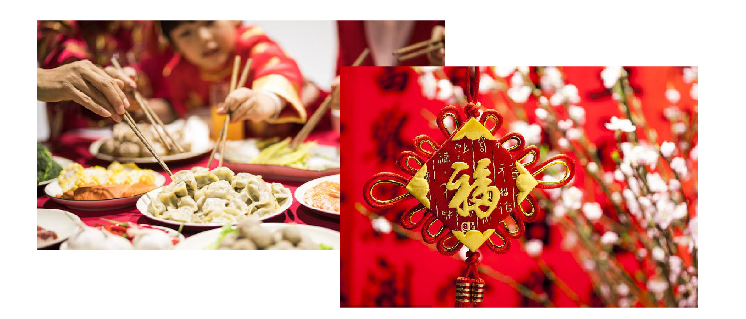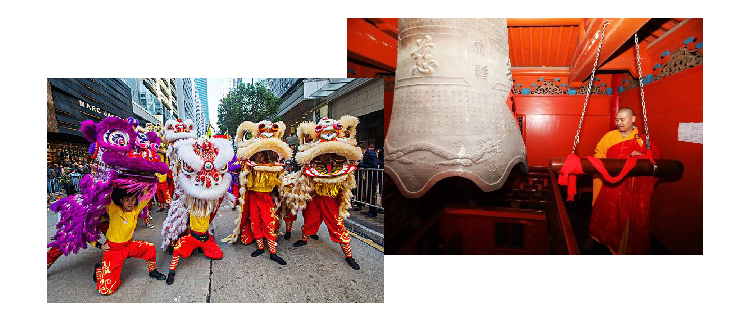Celebrating Chinese New Year
While the new year starts on Jan 1 in the West, China follows the lunar calendar, which runs on a 12-year cycle. The new year falls on the first day of the first lunar month, referred to as Spring Festival, which takes place on the second new moon after the winter solstice Spring Festival falls on Jan 22 this year, and will introduce the Year of the Rabbit. People born in this year are said to be very amiable and romantic.
Spring Festival is both China's biggest extravaganza and a day for family reunions. It is a vital ritual for Chinese people and many who live far away from their hometowns return home during this time, giving rise to what's often referred to as "the largest annual human migration in the world” or Chunyun.
The Spring Festival celebration starts on the 23rd or 24th of the 12th Lunar month. People often worship the Kitchen God, clean and decorate their houses, and do their shopping during this lead-up. Door panels are covered with Spring Festival couplets, highlighting Chinese calligraphy with black characters on red paper. The content varies, from the homeowners' wishes for a bright future to expressions of good luck for the New Year.
Pictures of the Door Gods, Qin Shubao and Gong Yuch, and a God of Wealth, Zhao Gong Ming, are posted on front doors to ward off evil spirits and welcome peace and abundance. Windows are decorated with red paper cutouts of various patterns, always including “Fu”, the Chinese character for blessing or happiness. These customs refer to the Chinese legend of Nian, a monster who would come out and wreak havoc by killing people, destroying crops and more at the end of each lunar year. People then took measures to send the monster away, such as putting up red couplets (Nian detested the color red,) and setting off fireworks and firecrackers at their doors to scare it away.
Spring Festival Eve is an important night -- family members eat dinner together, and the meal is more luxurious than usual. It must include dishes such as chicken, fish and bean curd, for their Chinese pronunciations, respectively "ji", "yu" and "doufu," signify auspiciousness, abundance and wealth. In North China while in South China it is more often niangao (New Year cake made of glutinous rice flour), because as a homophone, niangao means "higher and higher, one year after another."

After dinner, it is time for the eagerly awaited hongbao tradition, which is the custom of giving and receiving red envelopes. Traditionally, adults placed money into these envelopes, and gave them to children to wish them peace and good luck in the coming year. Nowadays, with the popularization of mobile payment in China, red envelopes can be sent to loved ones digitally, even if they are thousands of miles away.
Staying up late on New Year's Eve, or called “Shousui”, has two meanings: for the elderly it means "farewell to the old year", and heightens the importance of cherishing time; whereas younger generations stay up late, which symbolizes helping to prolong their parents’ lives. Lights or fire are lit on all night, in order to drive away all evil plagues and epidemics and to ensure the family’s wealth in the coming year.
A newer custom, introduced in 1983, is the Spring Festival Gala, a four-hour variety TV program, broadcast annually, which attracts the largest audience of any entertainment show in the world, with 1.3 billion viewers in 2022. It is often hailed as a cultural feast for Chinese people on New Year's Eve and is a cornerstone of conversation during this time.
Another option is to go to temples to listen to the bell ring and burn incense. Some temples hold a grand prayer meeting to pray for good luck in the coming year. In Buddhist temples the bell is rung 108 times, symbolizing the 108 worries, or impurities of thought, which can be dispelled by the ringing of the bell. People pray for good luck, great health and family happiness during the ceremony.

Every day until the first full moon of the lunar year has a special importance to it. Activities such as lion dancing, dragon lantern dancing, and temple fairs will be held for days, helping to extend the joyous atmosphere of Chinese New Year. The Lantern festival, which falls on the 15th day after the new year, marks the end of the Spring Festival celebrations.
Our Ribbon office used to arrange a dinner very close to lunar year-end where each of us would receive an animal puppet representing the Zodiac sign for the New Year, sing and dance and hold a drawing for prizes. While we’ve had to put these celebrations on hold due to COVID-19, we look forward to having it again next year.





